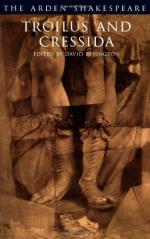|
This section contains 9,664 words (approx. 33 pages at 300 words per page) |

|
SOURCE: "Emulous Factions and the Collapse of Chivalry: Troilus and Cressida" in Representations, No. 29, Winter, 1990, pp. 145-79.
In the excerpt below, Mallin suggests that the misogynistic and homoerotic ambiguity and violence in the play reflect England's ambivalence toward the aging, increasingly less powerful and heirless Queen Elizabeth I.
In the state of England, anno dorn. 1600, Thomas Wilson describes a country besieged. Despite its renowned military force and well-fortified capital city, England suffered a pervasive fear of attack. Frequent skirmishes with Ireland and rumors of imminent Spanish invasion fostered a national preoccupation with war. Indeed, Wilson's description of private arsenals portrays an entire country armed and at the ready for battle: the law required every householder, "who soever he is," to have "in a readiness, such armes as is appointed by the Commisioners .. . at least a bill, sword, or dagger."1
This late Elizabethan obsession was born of vigilance against...
|
This section contains 9,664 words (approx. 33 pages at 300 words per page) |

|


